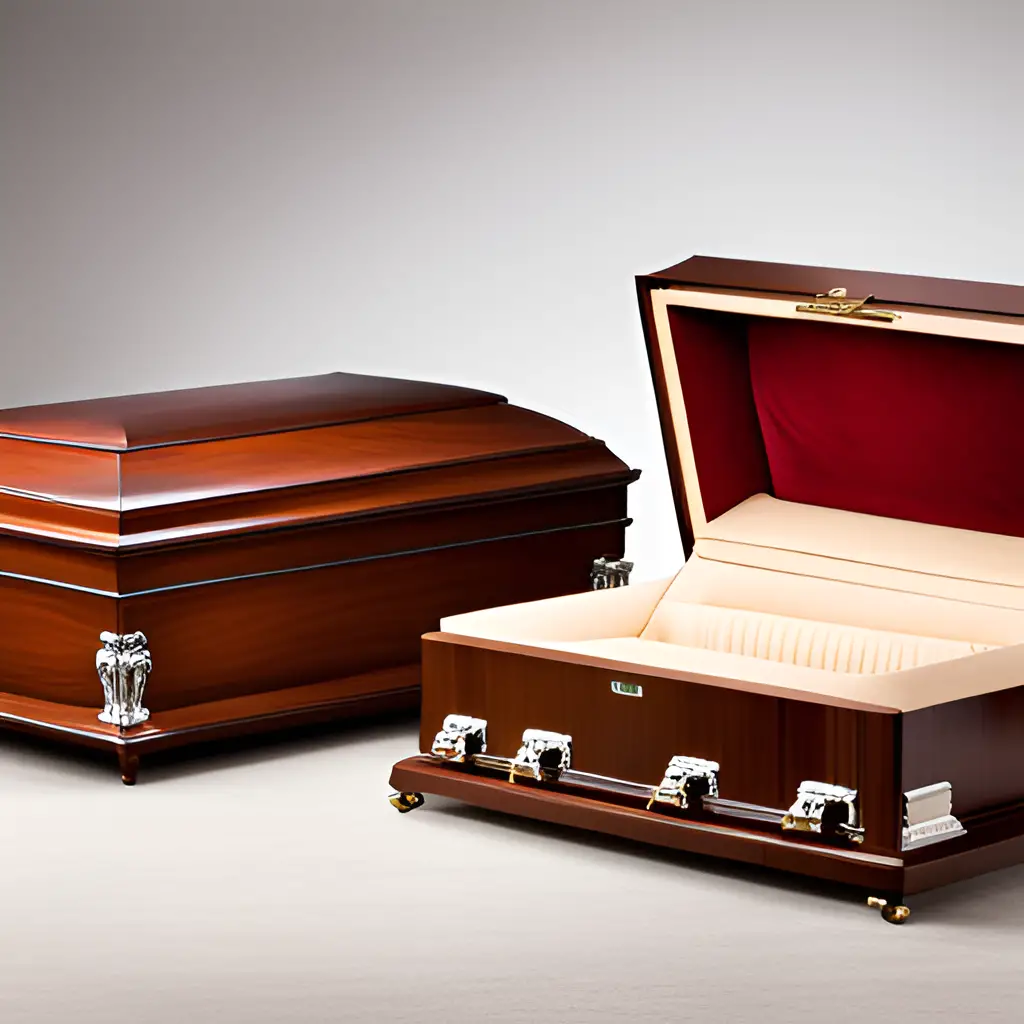Wooden caskets are made from a variety of materials depending on their intended final use and the level of desired quality. From a basic wooden casket that will be cremated to a high-end casket with elaborate design, the design and quality can vary widely.
Wooden caskets are typically made from solid wood, plywood, or wood veneer, depending on the type and design of the casket. The choice of materials can impact the cost, appearance, and overall quality of the casket.
Common Materials Used To Build A Casket
Here’s an explanation of each type of material used for wooden caskets:
- Solid Wood: Solid wood caskets are crafted from single pieces of natural wood, such as oak, cherry, walnut, mahogany, pine, or maple. These caskets are highly regarded for their beauty and durability. Different wood species offer distinct grain patterns, colors, and finishes, allowing families to select a casket that reflects their preferences and honors their loved one’s memory.
- Plywood: Plywood caskets are made by layering thin sheets of wood (usually less expensive species) and bonding them together with adhesives. The layers are oriented in alternating directions to enhance the casket’s strength and stability. Plywood caskets offer a cost-effective alternative to solid wood caskets while still providing a wooden appearance.
- Wood Veneer: Wooden caskets can also feature wood veneer, which is a thin layer of real wood applied to a substrate made of plywood or medium-density fiberboard
 (MDF). Veneers allow for the use of high-quality wood species on a more affordable base material. The veneer is carefully selected to showcase the wood’s natural grain and beauty.
(MDF). Veneers allow for the use of high-quality wood species on a more affordable base material. The veneer is carefully selected to showcase the wood’s natural grain and beauty.
In all cases, wooden caskets can be further enhanced with various finishes, stains, and protective coatings. These finishing touches not only add to the casket’s visual appeal but also help protect the wood and preserve its beauty over time.
Wooden caskets are popular choices for funeral services due to their warmth, elegance, and timeless appeal. Families often select wooden caskets to provide a dignified and meaningful final resting place for their loved ones. The choice of material depends on individual preferences, budget considerations, and the desire to pay tribute to the deceased through the natural beauty of wood.
Higher End Caskets Are Made From These Woods
Wooden caskets can be made from a variety of woods, each with its own unique characteristics. Some of the most commonly used woods for caskets include:
1. Oak: Oak is a popular choice for caskets due to its strength, durability, and attractive grain patterns. It is typically more expensive than other woods.
2. Mahogany: Mahogany is a hardwood that is known for its rich, reddish-brown color and beautiful grain patterns. It is a popular choice for high-end caskets.
3. Cherry: Cherry is a popular choice for caskets due to its warm, reddish-brown color and attractive grain patterns. It is a softer wood than oak, but still durable.
4. Maple: Maple is a strong, durable wood that is often used for caskets. It has a light, uniform color and a fine, smooth grain pattern.
5. Pine: Pine is a softer wood that is often used for caskets due to its affordability and availability. It has a light color and a distinctive grain pattern.
In addition to these woods, other types of wood such as poplar, cedar, and walnut may also be used for caskets. The type of wood used can affect the price, durability, and overall appearance of the casket.
You’ll notice that many of these woods are also used to produce urns.

Caskets To Be Used In A Cremation Are Made From These Woods
When selecting a casket for cremation, it is essential to choose a casket made from materials that are suitable for the cremation process. While there are no strict rules on the type of wood that must be used, caskets for cremation are typically made from simple and natural materials that are designed to burn efficiently with minimal emissions and with a lower price tag.
Common materials used for caskets intended for cremation include:
- Plywood: Plywood caskets are often chosen for cremation as they are made from layers of wood veneers bonded together with adhesives. Plywood caskets are lightweight and designed to burn evenly during the cremation process.
- Particleboard: Particleboard caskets are made from wood particles and resins compressed together. Like plywood, particleboard caskets are lightweight and suitable for cremation.
- Cardboard: Cardboard caskets have become increasingly popular for cremations due to their eco-friendly and biodegradable nature. They are made from sturdy cardboard and are designed to burn cleanly during the cremation process.
It’s important to note that caskets for cremation are generally simpler in design and construction compared to traditional burial caskets. They are made with minimal metal parts, as metals can cause issues during the cremation process and may need to be removed beforehand.
The choice of casket material for cremation should align with any personal or cultural preferences, as well as any eco-friendly considerations. Cardboard caskets, in particular, have gained popularity among those seeking more environmentally conscious options for cremation.
Ultimately, the focus is on providing a dignified and respectful final resting place for the deceased while considering the practical requirements of the cremation process.

